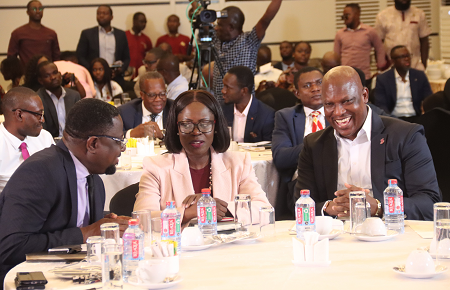The Securities and Exchange Commission (SEC) is to establish a special fund solely meant to protect investors against market failures.
It is to be known as the Investor Protection Fund (IPF) and a concept paper to help develop the fund into a vibrant scheme to provide protection for investors in the capital market has already been designed.
The Director-General of the SEC, Rev. Daniel Ogbarmey-Tetteh, who dropped the hint at the Graphic Business/Stanbic Bank Breakfast Meeting in Accra yesterday, said the fund, when established, would also provide minimum protection for investors in the event of a default by a company.
This comes at a time when investor confidence is fast waning as a result of the implementation of the Domestic Debt Exchange Programme (DDEP) meant to restore macroeconomic stability, reduce the government’s interest payment on loans and ensure more fiscal space.
Similar to GDPS
Rev. Ogbarmey-Tetteh noted that the IPF would operate like the Ghana Deposit Protection Scheme (GDPS), which protects small depositors against losses incurred by depositors as a result of the occurrence of an insured event.
“The fund is at the infant stage, but the idea is that the industry needs a support scheme that is broader and can cover the entire securities industry with a minimum protection.
“So we have successfully developed the concept paper and we intend to engage a consultant to structure the fund; we will also raise some capital to provide some form of protection for depositors,” he said.
He added that the mechanics of the fund were currently being decided but the intention was to create a safety net that would provide minimum support for investors.
The meeting
The breakfast meeting, an initiative of the GCGL and the bank, is a series of dialogues that feature selected topics and is aimed at influencing government policies in favour of businesses.
It brought together players in the private sector, policy makers, economists, among others, to deliberate on how the country can explore ways to restore investor confidence, post-DDEP.
The event also explored the lessons and implications of the DDEP — a prerequisite to access assistance from the International Monetary Fund (IMF) to resuscitate the ailing economy.
The meeting was on the theme: “Domestic debt change: Lessons and implications for how you invest” and it was chaired by the Managing Director (MD) of the Ghana Stock Exchange (GSE), Abena Amoah.
Other speakers on the day were an Associate Professor of Economics at the University of Ghana, Legon,, Prof. Festus Ebo Turkson, and a chartered accountant and former Chief Executive Officer (CEO) of the National Pensions Regulatory Authority (NPRA), Dr Dan Seddoh.
Financial literacy
Rev. Ogbarmey-Tetteh said one of the key lessons learnt from the DDEP was the fact that the macroeconomic environment could have an impact on investment.
On the role of investments in the national development agenda and their benefit to investors, he said investors needed to take financial literacy lessons seriously to be able to make informed decisions on how to invest in low- and high-risk instruments.
“It should be about how we improve financial literacy by getting people to understand that when selecting a particular asset class, there are potential risks involved.
“We need to protect ourselves to minimise the impact of risk on investment by understanding the investment landscape to be informed about how to invest," he said.
He urged investors to diversify their investments, no matter how good a particular asset class might appear.

Dr Humphrey Ayim-Darke (left), President, Association of Ghana Industries, interacting with Ato Afful (right), Managing Director, Graphic Communications Group Limited, and Abena Amoah (middle), Managing Director, Ghana Stock Exchange, during the Graphic Business/Stanbic Bank Breakfast Meeting in Accra. Picture: ELVIS NII NOI DOWUONA
Continue to invest
For his part, Prof. Turkson challenged Ghanaians to continue investing, despite market difficulties which had dampened investor confidence in recent times.
He explained that increased investments by Ghanaians would make it possible for the government to mobilise majority of its resources from within the country.
“Imagine that all the bond holders were domestic residents; we would not have been where we are today with regard to the IMF or the DDEP.
“We need to diversify our investments. We need not to put all our eggs in one basket. There is also the need to increase education on financial literacy, even in the local dialects to reach out to a lot of people,” he added.
Restoring lost confidence
Dr Seddoh encouraged regulators to do more to protect the interest of investors as a measure to restore the lost confidence in the financial market.
He underscored the need for the appropriate use of pension funds to help spur development and tame rising inflation in the country.
He added that inflation impacted negatively on pension funds and reduced the value of investments, hence the need to invest pension funds prudently.
Transparency
Ms Amoah said for confidence to return to the industry, it was critical for the government, private institutions and individual investors to conduct themselves in a transparent and accountable manner.
She noted that investors needed to think about diversification.

